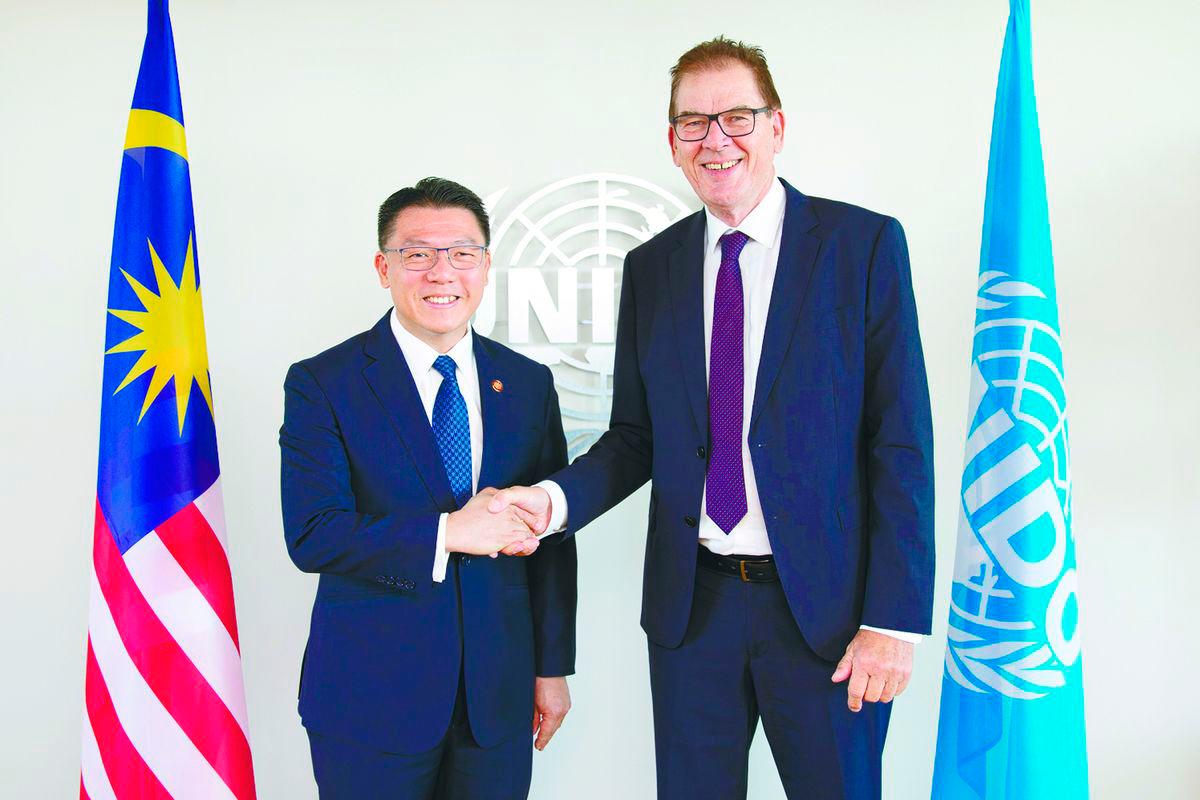PETALING JAYA: UN-Habitat Assembly president Nga Kor Ming has called for bold, collaborative action to advance the global green economy, including joint international guidelines for green industrial buildings.
His proposal during a bilateral meeting in Vienna recently with United Nations Industrial Development Organisation (Unido) director-general Gerd Muller seeks to establish shared sustainability standards ahead of the World Cities Summit (WCS) 2025.
Nga, who is also Housing and Local Government minister, said guidelines would be developed under a partnership between UN-Habitat and Unido, with each organisation playing a distinct role.
“Under this framework, UN-Habitat will advocate the adoption of green building standards among local councils globally, while Unido will act as the accrediting body for qualifying industrial buildings.”
The goal is to cut emissions from industrial developments and promote low-carbon industrial parks worldwide.
Nga emphasised the need for sustainable development that delivers real-world benefits like job creation and inclusive economic growth, especially in rural areas.
“Unido has a vital role in this transformation, particularly in the circular economy, green manufacturing and agro-industries. The time to act is now. We must create jobs, empower local councils and ensure that our progress is built on innovation and measurable results.”
A joint agreement to reactivate the MoU signed between Unido and UN-Habitat in 2017, with renewed focus on climate-resilient development and rural council empowerment was taken at the meeting.
Nga, accompanied by Kuala Lumpur Mayor Datuk Seri Maimunah Mohd Sharif and Malaysia’s Ambassador to Austria and Slovakia Ikram Mohammad Ibrahim, also paid a courtesy call on the Lord Mayor of Vienna Dr Michael Ludwig.
Nga congratulated Ludwig on his re-election and commended Vienna’s achievement of being named the world’s most liveable city for three consecutive years, a feat he attributed to strong leadership and smart urban planning.
“Vienna’s urban success story proves that with vision and good governance, heritage and innovation can thrive side by side.
“As UN-Habitat Assembly president, I look forward to bringing these insights home and inspiring transformative change,” said Nga.
During the 14th Mayors Forum at the WCS 2025 in Vienna, Austria on Thursday, Nga called for stronger international collaboration anchored in local action, emphasising that city-to-city cooperation must move beyond dialogue and translate into concrete, results-driven partnerships with clear timelines.
“We must institutionalise knowledge-sharing and back our intentions with innovation funding, technical hubs and measurable outcomes.”
Nga proposed three key mechanisms for this, including joint innovation funds for shared urban challenges, regional hubs to address common issues and standardised metrics to track citywide progress globally.
He said these strategies are drawn from Malaysia’s own experience and supported by platforms such as the Malaysia SDG Cities Roadmap, Asean Smart Cities Network and the Asia-Pacific New Urban Agenda Platform to encourage knowledge sharing and scalable solutions.
Highlighting global best practices, Nga cited transformative urban innovations such as Barcelona’s Superblocks, Yokohama’s Zero Waste policy and Curitiba’s Bus Rapid Transit system.
Following his visit to Seestadt Aspern, Vienna’s flagship smart district, Nga praised the city’s long-term planning, heritage preservation and people-centric design.









